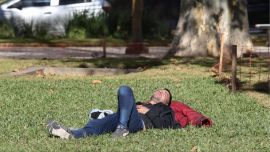I share in the sadness felt by many at the news of the death of Andrew Graham-Yooll, a great colleague and enduring friend. The news reached me while I was back on a visit to Latin America, a continent that forged us both professionally, and where we shared friends and formative experiences.
I will never forget the first time we met in the late 1970s. I was in the early stages of my journalistic career working in a desk job in Smithfield, London, for the newsagency Interpress, covering Argentina during the bloody years of the Videla/Massera/Agosti junta military regime. I was immersed in a story about the exiled Isabelita Perón, when in came this stocky haggard-looking dark-haired and bearded Scotsman dressed in a crumpled duffle coat.
He struck me almost as a tramp, just in from the street, although he turned out to be a refugee. As I soon discovered, Andrew had been forced to flee Argentina, the country where he had been born and brought up in. Andrew’s courageous work reporting on human rights violations for the English-language Buenos Aires Herald had earned him and the newspaper’s editor Bob Cox seperate death threats from the regime’s associates and both had ended up having to abandon the country for their own safety – Cox to the United States, Andrew to the United Kingdom.
Andrew went on to write and publish his seminal Portrait of an Exile, which I reviewed at the time for the Catholic international weekly The Tablet, now edited by the excellent Brendan Walsh. I still consider the book the most moving and incisive personal account of the emotional, ideological and political experience of the Argentina of the juntas and the existentialist challenge of any journalist dealing with love, fear, and dislocation in the context of political repression and exile.
Andrew would go on to write another memorable book called The Forgotten Colony on the history of the British community in Argentina, well-researched and drawing on his own Scottish and Anglo-Argentine background.
After that first encounter Andrew went on to freelance for The Daily Telegraph and The Guardian, reporting for the latter during the Falklands (Malvinas) War, while I was working as Buenos Aires correspondent for the Financial Times.
The experience of the war bound us together further, with our friends the Indian-born photographer John Fernandes (a Buenos Aires Herald veteran) and his then-wife, the Argentina journalist María Laura Avignolo, part of our closely-knit circle of companionship and solidarity. Several good friendships I owe to Andrew’s generosity of spirit.
He had returned to Buenos Aires to cover the Falklands War, not without risk as it turned out, as he once again suffered intimidation from the military regime, thankfully without fatal consequences. He survived writing colourful and harder-hitting pieces about life in Buenos Aires, as the Argentine junta’s disastrous invasion of the disputed islands in the South Atlantic unfolded.
After the war, and the collapse of the military regime, Andrew came to see his old friends at a house in the neighbourhood of Olivos I shared for a time with John and María Laura. The occasion was a memorable, discreet lunch we had organised. Our guest was the disgraced Argentine military governor of Las Malvinas: General Mario Menéndez.
From that lunch, Andrew produced a beautifully written piece for The Guardian, subsequently reproduced in a published collection of his best articles, entitled ‘Curry with the General’ – a reference to the meal cooked by John, drawing from the spices and curry paste he regularly stocked at home. The piece mentioned the graceful and calm presence of my English wife Kidge, someone he always showed a huge fondness and respect towards.
The article accurately painted the scene: a lunch of pathos and self-delusion as personified by Menéndez, a failed commander with blood on his hands dating back from the days of the repression of political dissidence in Argentina.
Andrew later showed his customary courage by agreeing to a request from the post-war democratically elected president Raúl Alfonsín to be a witness in the criminal trial in abstentia of former Montonero guerrilla leader Mario Firmenich, who was in exile in Spain.
The prosecution focused on the kidnapping and multimillion dollar ransoming of members of a very well-known and rich agrobusiness family, in the 1970s, and the subsequent ransom demand from the Montoneros for the duo. Andrew, who was then working for the Herald, acted as a go-between in the secret negotiations that eventually led to the businessman’s release from clandestine captivity.
Appearing as a witness against Firmenich was again not without risk, given the Montonero’s leader’s history of justifying violence against opponents. Andrew, in the view of some of his former anti-military friends, had betrayed the revolutionary Peronist cause.
After I finished my five-year posting in Buenos Aires and returned to the FT HQ in London, Andrew settled in Argentina, periodically visiting the UK where his children and former wife lived. We kept in touch and I would try and look him up whenever I returned on assignment to Buenos Aires, always finding him to be an invaluable well-informed and objective source on the local scene.
His later years saw him return to Herald as its editor and as a columnist in publications like Perfil and embarking on further book projects, none of which achieved the notoriety of Portrait of an Exile, which continued to run into several editions in English and Spanish.
Andrew did not age well, however. He suffered his first heart attack some years ago, and he found finding a stable personal life challenging. He loved his children, and tried his best to maintain good relations with his ex-wife, who had loyally stood by him during the years of persecution and displacement.
Some months ago I received an email from Andrew telling me of his plans to come to London this summer and hoping we could meet up. Sadly it was not to be. The news reached me a few days ago, as I landed in La Paz, in separate successive texts from María Laura and John. We shared our grief in the passing of a noble colleague.
My prayers and thoughts are with Andrew’s family. May you rest in peace dear friend y compañero.


























Comments